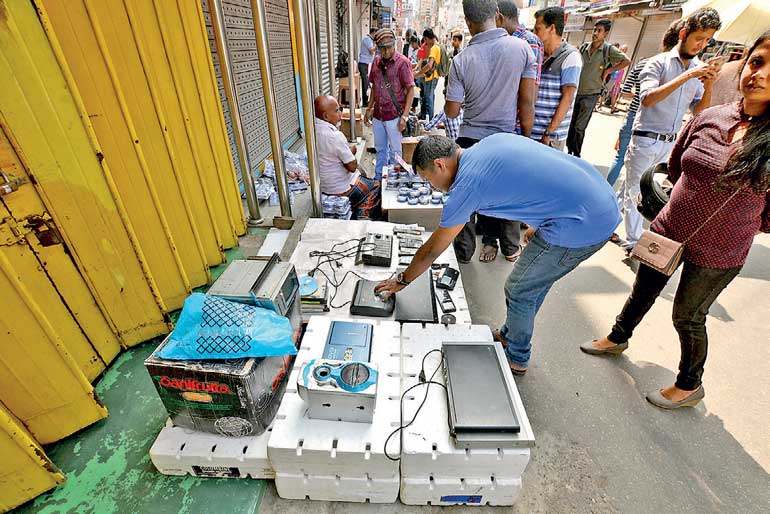Tuesday Mar 03, 2026
Tuesday Mar 03, 2026
Tuesday, 25 January 2022 01:17 - - {{hitsCtrl.values.hits}}

Most entrepreneurs tend to forget the pre-planning part before starting a business as they get immersed in the post-planning part – Pic by Shehan Gunasekara
 As a banker sometimes it is gut wrenching to see some very promising small and medium-sized enterprises (SMEs) go bust after a while, despite the best efforts from third party stakeholders such as banks and other financiers to resuscitate such businesses and ensure continuity. Of late, this has happened too often, largely due to the colossal economic impact brought about by the COVID-19 pandemic-related mobility restrictions.
As a banker sometimes it is gut wrenching to see some very promising small and medium-sized enterprises (SMEs) go bust after a while, despite the best efforts from third party stakeholders such as banks and other financiers to resuscitate such businesses and ensure continuity. Of late, this has happened too often, largely due to the colossal economic impact brought about by the COVID-19 pandemic-related mobility restrictions.
But even before that, it is safe to say SMEs didn’t have the best of times. The rate of SME failure in Sri Lanka is estimated at 45-50%, and the pandemic may have worsened that rate. Yet, it is estimated that SMEs contribute nearly 70% to Sri Lanka’s Gross Domestic Product (GDP) and employment generation. Hence, reducing the SME failures remain extremely vital to the health of the national economy. To do that, it is important to understand the foremost reasons behind SME failures, and find solutions for each problem in a systematic and sustainable way.
Access to finance
Throughout the years many have identified lack of access to adequate financial resources as a key obstacle in the way of SMEs. Yes, Sri Lankan banks and finance companies remain rather conventional compared to global standards, but over the years, they have been seen stepping out of their comfort zones and taking some risks in providing capital to some of these SMEs. Nowadays, most financial institutions are willing to lend based on a solid business plan, sometimes even without collateral. Compared to earlier, banks and other financial institutions also now tend to get a lot of foreign funding from development financiers, impact investors etc. to be on-lent to SMEs. Hence, though access to finance still may remain a problem for some SMEs, more and more SMEs now have the ability to access bank funding to set up and expand their businesses.
So, even with improved access to finance, why do so many SMEs fail or discontinue their operations midway? While there are things out of the control of SMEs, such as sudden changes in import and tax policies, new rules and regulations imposed by the government from time to time or even pandemics, such as the one we are experiencing now, which sometimes cause certain SMEs to scale down their operations or completely close down, a good majority of the reasons for business failures are self-inflicted.
Financial literacy
The biggest issues as I see with Sri Lankan SMEs are to do with lack of financial literacy. This is a major problem the Sri Lankan educators and policymakers strive to address immediately. This may have to do with the ill-conceived Sri Lankan attitude to perceive money as something bad or even evil. Money can be a great tool that can be used to your advantage. As long as you can control the money and not the other way around, money will work for you.
Thus, financial literacy will no doubt come in handy—even the basics—when a person is starting a business or even managing his or her own day-to-day financial needs. Sound financial management and decision-making, business planning and maintaining an effective and updated record management system for tax and audit purposes are key aspects for business of any size to succeed.
Financial institutions can play a role here by educating and making their clients aware of the benefits of these. It is encouraging to see that some Sri Lankan banks and finance companies have realised the need and have taken a lot of progressive steps towards coaching their clients as it creates a win-win situation for the entrepreneur as well as for the financial institution that lends money.
Lack of market research
While too much analysis will get you nowhere, too little analysis could get you in trouble. Another key reason that contributes to higher rate of SME failure in Sri Lanka is the lack of market research before venturing into world of business. Most entrepreneurs tend to forget the pre-planning part before starting a business as they get immersed in the post-planning part. Without proper market research before starting a business, how can you price your product? Assess your competitors and see where you can fit in? If not, you will produce the same generic product, which is already available in the market. The post-planning part, which largely involves sales, pricing and customer services can take you so long as good and unique as your product that fulfils a specific market requirement.
Over diversification
Forgetting or ignoring the core business has made a lot of Sri Lankan small businesses go under. To diversify or not to diversify is a perennial question many businesses have irrespective of their size. But compared to a large business house, a diversification failure can be the end of the road for a small business, whereas a big business in most cases, has the wherewithal to move forward absorbing the loss. Legendary investor, Warrant Buffet, the Oracle of Omaha, once said, “Never invest in something you don’t understand.” If this is a good enough rule to live by for Buffet, who is among the top 10 richest persons in the world, it should be good enough advice for you to heed.
Family and management skills
You may have started your business with your spouse from the scratch, which is now doing well. At one stage you will have to think about succession. Almost 100% of small businesses in Sri Lanka are family-run. Hence the tendency is to pass baton to the children. But if the son or the daughter doesn’t have the required management skills, knowledge and the temperament to run the business, the business you have built with your blood and sweat for a quarter century can disappear within a matter of a few years.
This is why some far sighted businessmen, whose businesses have survived to this day, gradually took their family members out of the business’ day-to-day operations and transferred such responsibilities to professionals who are better equipped with the required skills, while having a firm grip on the ownership. They also armed their director boards with talent and capacity in line with their future vision for the business. So, in a nutshell, don’t give your family members a free pass, as they may not be the most suitable candidates to take over from you to steer the ship into the future.
Recommendations
As aforementioned, small businesses play a major role in Sri Lanka’s economy. Their health will ensure the health of the country’s economy. Hence, the relevant agencies and institutions both in public and private spheres should work towards reducing the rate of failure of SMEs in Sri Lanka. Targeted awareness and educational programs will be key in tackling this, while taking robust measures towards equipping all Sri Lankans with financial literacy by radically changing the school curriculum could contribute to Sri Lanka’s entrepreneurship and start-up landscape immensely.
Financial institutions can also step up their own programs to educate their SME clientele and engaging with them on a regular basis. Further, converging of all the agencies and organisations that are there to provide advisory services to SMEs and startups into a centralised platform could make the access to such services easier.
(The writer is the General Manager/CEO of People’s Bank.)